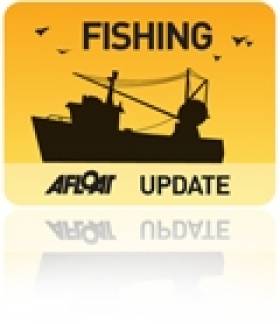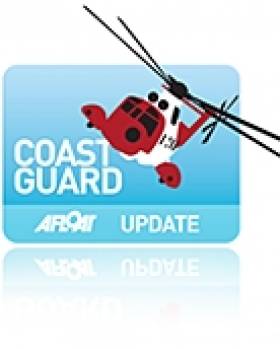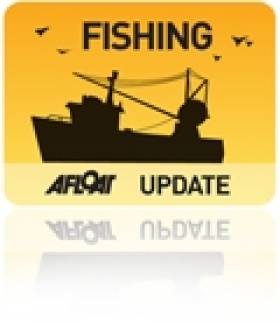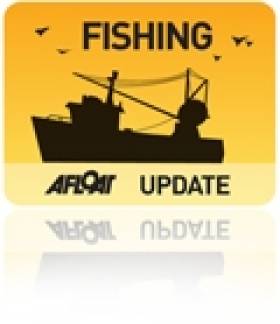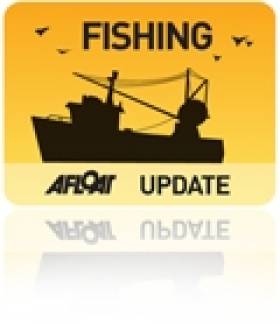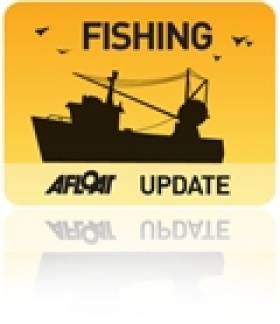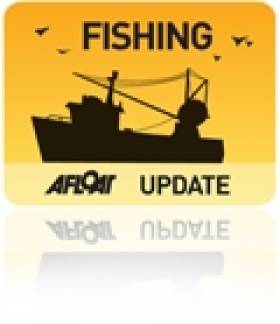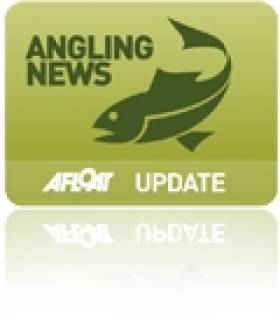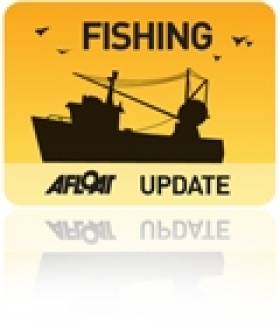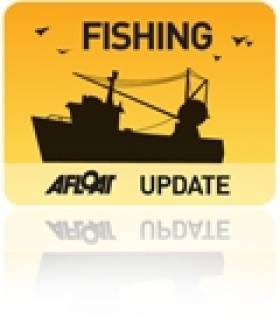Displaying items by tag: Fishing
Fisherman Affected By Storms Need Govt Assistance Says Senator
#Fishing - A Galway senator has called for Government assistance for inshore fishermen devastated by the recent storms that have ravaged the west coast, damaging vessels, piers and slipways - and devastating many small coastal shellfish farms.
As Galway Bay FM reports, Senator Trevor O' Clochartaigh (Sinn Féin) has suggested Marine Minister Simon Coveney could bail out via an emergency fund fishermen whose livelihoods have been threatened.
Similar funding has been called for to help repair coastal roads in Galway rendered impassable by the exceptional winds and flooding since the New Year began.
In addition, Galway West TD Eamon O Cuiv says he will press the Government to make funds available for the Aran Islands and the Connemara region, both of which have been severely affected by the worst storms in recent memory.
The nation was this week left counting the cost of the extraordinary series of storms, in particular Lahinch in Co Clare, which suffered millions of euro worth of damage to its seaside promenade as massive swells encroached half a kilometre inland.
Six lighthouses also sustained structural damage in what were often hurricane-force winds, though all remained operational.
Severe Weather Prevents Coastguard Medevac From Spanish Fishing Boat
#Coastguard - TheJournal.ie reports that yesterday's severe storm conditions forced two Irish Coast Guard helicopters to stand down a mission to retrieve an ill fisherman from a Spanish trawler 100 miles off the west coast last night (27 December).
A coastguard spokesperson has since confirmed that the fishing vessel later arrived near Castletownbere in West Cork where the crewman casualty, who complained of chest pains, was being assessed.
Quota Cuts 'Threaten Jobs' In Irish Fishing Industry
#Fishing - Marine Minister Simon Coveney has defended a deal reached in Brussels that will see a reduction in Ireland's quotas for prawn and haddock, which some argue will cost the economy many millions of euros.
As The Irish Times reports, the Federation of Irish Fishermen (FIF) says as many as 350 jobs could be lost following the EU Fisheries Council's agreement to cut the Irish prawn quota by 9% and the haddock quota by a third - a move FIF's chair Francis O'Donnell described as "a charter for discards".
O'Donnell says that the cuts to two of Ireland's most valuable catches, plus similar reductions for cod and whiting, will mean an 8% overall income loss for the Irish fishing fleet - despite significant and welcome quota increases for hake (49%), megrim in the north-west (20%) and monkfish in the south-west (15%).
Defending the deal, Minister Coveney says people "need to look at the whole package", emphasising that the "overall value of fishing opportunities" is the same as last year, at a value of €250,000, which in his view "can keep the fishing fleet intact, and commercially viable".
The Irish Times has much more on the story HERE.
Marine Minister Warns Of 'Exceptionally Tough' EU Fisheries Negotiations
#Fishing - Marine Minister Simon Coveney is attending the EU Fisheries Council in Brussels from today (16) till Wednesday 18 December, where quotas for the Irish fishing fleet for 2014 will be determined.
According to the minister's department, the proposals put forward from the European Commission impact the Irish white fish sector with severe cuts in many stocks of vital importance to Ireland.
This year’s negotiations will also be heavily impacted by the lack of progress on the annual talks on fisheries opportunities for 2014 between the EU and Norway and between the EU, Norway, the Faroe Islands and Iceland.
This lack of progress means that the council will only be able to discuss provisional quotas for mackerel, blue whiting and Atlanto-Scandic herring for 2014.
Minister Coveney said: “I have considered the scientific advice available on fish stocks carefully. In some cases the advice is firm and it is clear that quota reductions will be required. However, I am not convinced that the proposed level of cuts is justified in certain cases.
"The total financial impact of the proposed cuts would, according to Bord Iascaigh Mhara (BIM), amount to over €70 million. I accept that some reductions are inevitable to protect the health of stocks, but I also believe that the commission’s interpretation of the scientific advice in some cases is excessively precautionary and will only result in increased discarding of fish at sea.
"I do not wish to see the council taking decisions which could result in an increase in quota driven discards. In such cases, I will be making a strong case for a more reasonable approach to the available advice, especially in mixed fisheries.”
The minister went on to highlight some of the proposals where he is especially concerned about the potential negative effect on incomes in Ireland's coastal communities.
“The commission is proposing a 24% cut in the hugely important prawn fishery. I do not consider that this proposal is justified and I am working with my UK colleagues to convince the commission to adjust its approach," he said.
"In the Celtic Sea, I am extremely concerned about the proposals to cut Haddock by 75%, cod by 33%, whiting by -22%, megrim by -20% and sole by 20%.
"Other proposed cuts in stocks of particular concern include pollack (-20%), haddock and cod in the Irish Sea (-20%) and sole in the Irish Sea (-33%) as well as horse mackerel (-40%) and monkfish in the North West (-20%).”
On the matter of the international negotiations on certain fish stocks of importance to Ireland, Minister Coveney said: “The failure to make progress on the EU/Norway negotiations has compounded the stalemate in the Coastal States negotiations on mackerel, blue whiting and Atlanto-Scandic herring. I am supporting an overall balanced agreement on these very important stocks.
"I do not support the current commission proposal, granting Iceland and the Faroes an excessive share of the mackerel stock, which is of such vital importance to Ireland. Mackerel is our single most valuable fishery and I will again be insisting that the commission work closely with Norway on securing a fair and proportionate sharing agreement.”
Concluding his remarks in advance of the council, Minister Coveney said: “Every December Fisheries Council is difficult, but I think that this year’s could be one of the most difficult for some time and we should not underestimate the immense challenges facing us in trying to obtain a fair and rational, biologically and economically sustainable outcome for Ireland.
"I have worked closely with industry and other stakeholders to prepare for these extremely tough negotiations and will continue to do so in the challenging days and nights ahead. There will be cuts to some quotas important to Ireland, in the white fish sector, but there will also be some positive news, particularly for some pelagic species.
"I will be devoting all my efforts to reducing the scale of those cuts, taking account of the scientific advice. I will work with other member states such as the UK and France and with the European Commission to try to achieve an acceptable outcome.”
Fishing Dispute Grounds Wexford Trawler Crews
#Fishing - The crews of 15 fishing vessels in Wexford operated by the O'Flaherty brothers have been temporarily laid off in a dispute over regulations, as RTÉ News reports.
It's emerged that the Sea-Fisheries Protection Authority last week issued orders for all 15 boats in the O'Flaherty fishing fleet to cease operations immediately, days after two boats were recently questioned over alleged infractions of fishing regulations.
The Department of Agriculture and the Marine has not commented on the reasons for issuing cessation orders to the O'Flahertys.
Seamus O'Flaherty - one of four brothers who operate the Kilmore Quay-based fleet - was in the news this time last year when he gave away free monkfish to the public on the quayside after exceeding the EU quota with his catch.
Jimmy Byrne, skipper of the O'Flaherty-owned Saltees Quest, defended the display as a protest against the EU mandate to discard all over-quota fish at sea - a practice that is hoped will come to an end with the new Common Fisheries Policy.
National Discards Implementation Group to End Wasteful Discarding of Fish Practice
#fishing – Minister for Agriculture, Food & the Marine, Simon Coveney TD, today appointed Dr Noel Cawley to chair a national Discards Implementation Group. The introduction of a new policy that ends the wasteful practice of discarding fish at sea is a key part of the reformed Common Fisheries Policy which was successfully negotiated to conclusion under the Irish presidency earlier this year.
Minister Coveney said "I am delighted that Dr. Cawley, with his deep knowledge of the Irish fishing industry, has agreed to chair a national Discards Implementation Group that will ensure that the Irish fishing industry are fully prepared for, and engaged in, the implementation of the discards ban." The Minister added "I know that the experience that Dr. Cawley will bring to bear on the practical issues surrounding the phasing in of the discards ban will ensure that the Irish fishing industry will be fully prepared for this fundamental reform in fishing practices".
In a further practical step in the implementation of the new CFP, Minister Coveney also hosted the first meeting of the North Western Waters Regional Group of Member States. This group of Member States (Ireland, Netherlands, France, Belgium, Spain and the UK) has come together to develop the possibilities for more co-operation and regional decision making under the new CFP.
Minister Coveney said "I was determined that Ireland would take the lead in hosting the first meeting of this Regional Group. This is the mechanism under the reformed CFP which will allow us get to real regional decision making and gets us away from the 'one size fits all' that sometimes characterised CFP decision making in the past. It is through this group which will work in close association with stakeholders that decisions affecting Irelands fishermen may be taken in the future and it is vital that we are at the heart of this new decision making process. The work of Dr. Cawley's group will be central to ensuring that the practical issues around the introduction of a discards ban, as identified by the Irish fishing industry, will be developed into long term sustainable management tools that will safeguard the future of our coastal fishing communities".
Under the regionalisation provisions, decision making can be decentralised from Brussels and future management arrangements will instead be decided together by relevant Member States. It is this Group, working with stakeholders in the Advisory Council's that will in the future manage fisheries in the water where Ireland has quotas.
Minister For the Marine to Enter Tough Fishing Negotiations Next Month
#fishing – Minister for the Marine Simon Coveney today met with the fishing industry and environmental groups to discuss the proposals from the European Commission on fishing opportunities for 2014 in advance of annual negotiations in December. The Programme for Government 2007 – 2012 states that a Sea Fisheries Sustainability Impact Assessment, based on consultation with all major stakeholders, will be brought before the Dáil annually before EU fisheries negotiations commence.
Today's meeting was part of that consultative process. The Minister said "It is important all relevant stakeholders have the opportunity to have their say on the proposals from the Commission given their significance for our coastal communities. It is crucial for me that I have a clear understanding of all viewpoints before I enter what will be very tough negotiations in December. I intend to work closely with fellow Member States with shared interests and with Commissioner Damanaki in order to ensure that the TACs and quotas agreed for 2014 are balanced and take account of the scientific advice".
Submissions can be forwarded electronically via the web portal www.fishingnet.ie until 22 November. All submissions received, subject to legal and editorial considerations, will be published on the website to broaden the debate.
IFI Secures Prosecutions For Illegal Fishing In Louth and Meath
#Angling - Inland Fisheries Ireland has secured victory in recent prosecutions against illegal fishing in Co Louth and Co Meath.
In Dundalk, Pat Smith of Annagassan, Co Louth was fined €100 for illegal salmon fishing and ordered to pay total costs of €460 to IFI in Drogheda District Court on 27 September.
His co-accused, Jimmy Mulroy, also of Annagassan, Co Louth was fined €100 for illegal salmon fishing and ordered to pay total costs of €777 to IFI in Drogheda District Court on 22 October.
On 13 June this year, Smith and Mulroy were found to be illegally fishing for salmon at Annagassan, which is the meeting point of the Rivers Dee and Glyde.
Fisheries officers Dermot Wynne, Thomas Duffy and Seamus Kelledy apprehended the two men, who pleaded guilty to the charges brought against them.
Judge Flann Brennan convicted both individuals under Section 95 of the 1959 Fisheries Act for having a net in their possession which was capable of capturing salmon.
Numbers of salmon in the entire Dundalk Bay area dropped from a 1970s peak of many thousands of commercially caught fish to an all-time low in 2006 when just 225 specimens were caught.
This led to the closure of all salmon fisheries in the region, with fishing restricted to catch and release only for salmon on the Dee and Glyde.
Elsewhere, IFI had success with recent court cases at Whitewood Lake in Kilmainham Wood, Co Meath resulting in fines of €500 issued and expenses of €2,024 awarded.
Jonas Kavaliauskas of Clondalkin, Dublin 22 was apprehended by fisheries officer Ronan O'Brien while fishing suspiciously at Whitewood Lake in May this year.
Kavaliauskas was found to have 57 coarse fish in his possession. This is in breach of the coarse fish byelaw which allows an angler to have four coarse fish under 25cm.
This case was heard on 20 September at Kells District Court and Kavaliauskas pleaded guilty. Judge Denis McLaughlin convicted him for breaches of the coarse fish Byelaw 806 of 2006. The defendant was fined €100 with six months to pay and IFI was awarded €714 in expenses.
A second case was heard on 9 October at Navan District Court, which heard that in August this year Petre Tuica of Nephin Road, Dublin 7 and Iosif Ciocan of Fernleigh, Dublin 15 were fishing at Whitewood Lake and found to be in possession of 60 fish.
Both individuals were apprehended by Assistant Inspector Ronan O’Brien as they had more than four coarse fish in their possession.
Ciocan did not appear in court and Tucia pleaded guilty. After hearing the evidence, Judge Patrick Clyne found both defendants guilty and convicted them for breaches of the coarse fish Byelaw 806 of 2006.
Ciocan was fined €200 with 14 days to pay with five days imprisonment in default and to pay €655 in costs. Tucia was fined €100 with one month to pay with five days imprisonment in default and to pay €655 in costs to IFI.
Whitewood Lake is a notable coarse fishery in the Kilmainham Wood area of Co Meath containing stocks of roach, bream, hybrids and pike.
Galway Fishermen To Get CFP Funds While Jellyfish Cause Salmon Losses
#Fishing - Galway fishermen will be among those in receipt of a €6.5 billon aid package to help Europe's fleets comply with the discard ban under the reformed Common Fisheries Policy that was approved by the European Parliament this week.
Galway Bay FM says the funding will go towards the purchase of more advanced selective fishing gear and improving safety on board fishing vessels, as well as updating port infrastructure.
Meanwhile, Galway Bay FM also reports that losses at salmon farms on the west coast are being attributed to attacks by jellyfish.
Bord Iascaigh Mhara (BIM) says the mauve stinger (Pelagia noctiluca), which normally inhabits the deep ocean and rarely comes inshore, has been getting into open cage salmon rearing stations.
EU Parliament to Vote on New Common Fisheries Policy
#ReformedCFP- By coincidence on today's public auction of decommissioned L.E. Emer, which carried out countless fishery maritime patrols, MEP's are to vote on the EU's new policy of the European Maritime and Fisheries Fund (EMFF): 2014-2020, writes Jehan Ashmore.
The EMFF is the third and final legislative file in the reform of the common fisheries policy (CFP) which has seen the fishing industry particularly dependent on subsidies down through the years.
The subsidies account for 40% of the landing price accounted for from both direct and indirect public funded monies. The upgrading of existing boats and new vessels provided by grants further accentuates problems by impacting on reducing fish stocks.
The Environmental Pillar are calling on MEP's to end years of over-fishing in the industry which has progressively led to lost jobs due to subsidiary-driven growth and renovation of the EU's trawler fleet.
The umbrella group comprises 26 national environmental organizations that campaign to protect and enhance the environment and also promote economic creation through sustainable eco-systems.
In addition Environmental Pillar are seeking increased financial aid to gather data collection, control and enforcement of the industry.
Among those making up the diverse group are: An Taisce, CoastWatch, Irish Whale & Dolphin Group, Irish Doctors' Environmental Association, Irish Natural Forestry Foundation and Zero Water Tolerance.


























